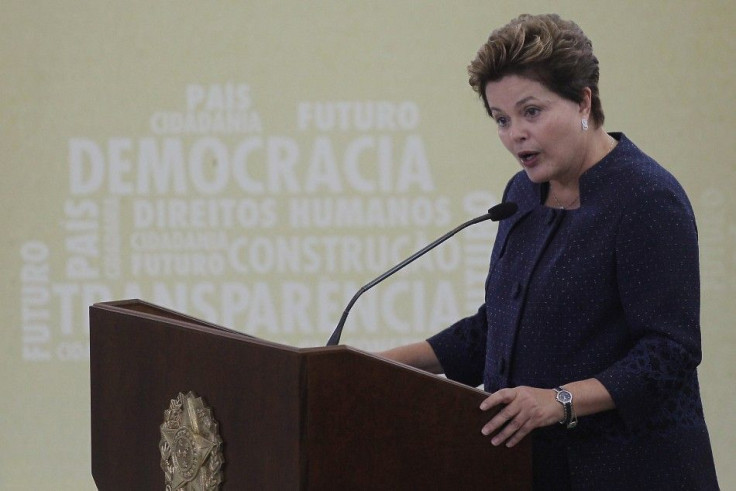Brazil Truth Commission Aims To Uncover Rights Abuses During Military Regime

Brazilian President Dilma Rousseff inaugurated on Wednesday a truth commission set up to investigate human rights abuses during the country's military regime -- 27 years after democracy was restored.
The seven-member commission is charged with examining the period from 1946 to 1988, specifically focusing on the 21 years under the military dictatorship from 1964 to 1985 in which more than 400 people were either killed or disappeared and thousands more were imprisoned and tortured.
A military-era amnesty law protects military officials from prosecution, which will prevent the commission from bringing anyone to trial.
President Rousseff, who as a then-leftist radical was herself imprisoned for three years during the seventies and allegedly tortured under the military regime, said the object of the commission was not to exact revenge, but to expose and honor the truth.
Brazil deserves the truth, new generations deserve the truth, President Rousseff said, adding that, above all, the relatives of those who died deserve the truth, BBC reported.
Nevertheless, some military officials have criticized the commission's aims, believing to them to be vindictive and biased.
Of course there were terrible things that happened in this period but there were victims on both sides and they only want to tell one side of the story, said retired Vice Admiral Ricardo Antonio da Veiga Cabral, chairman of Rio de Janeiro's Navy Club, BBC reported.
Veiga Cabral added that the Navy Club has designated seven of its own members to form a shadow commission that will counter any accusations made against former officers.
Alleged victims of the military regime, along with their families, have expressed misgivings about the commission as well, frustrated by its inability to prosecute perpetrators of human rights violations.
We wanted a 'Truth, Memory and Justice' Commission. With the resources and powers given to the commission I doubt very much they will be able to come up with anything groundbreaking, said Victoria Grabois, president of Rio de Janeiro-based organization Tortura Nunca Mais (Torture Never Again), BBC reported.
Grabois' father, Mauricio Grabois, was a high-ranking Communist Party official who has been missing since 1973, following a military raid of guerrilla camp where he was last seen.
Beginning in the late sixties, Communist guerrillas began a resistance movement against the military regime following violent suppression of anti-government protests.
An amnesty law, passed in 1979 and upheld by the Brazilian Supreme Court in a 2010 ruling, protects both military officials and guerrilla rebels from prosecution for alleged crimes committed against the other side.
Members of the commission also made it clear that they do not intend to undo the protections provided by the amnesty law.
We are not here to punish, that's not the job of any truth commission in the world, said commissioner Paulo Sergio Pinheiro, a Brazilian legal scholar who is also currently also the Chairman of the UN's International Commission of Inquiry for Syria and former UN Special Rapporteur for Burma, BBC reported.
We have to make a complete, complex and honest investigation of the crimes that the state has already taken responsibility for, he added. The side that matters is the side of the victims.
© Copyright IBTimes 2025. All rights reserved.





















